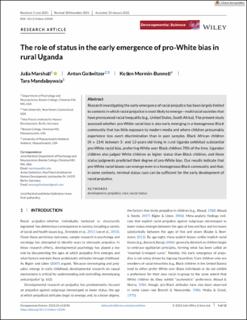The role of status in the early emergence of pro-White bias in rural Uganda
Peer reviewed, Journal article
Published version
Permanent lenke
https://hdl.handle.net/11250/3009728Utgivelsesdato
2022Metadata
Vis full innførselSamlinger
- Scientific articles [2173]
Sammendrag
Research investigating the early emergence of racial prejudice has been largely limited to contexts in which racial prejudice is most likely to emerge—multiracial societies that have pronounced racial inequality (e.g., United States, South Africa). The present study assessed whether pro-White racial bias is also early emerging in a homogenous Black community that has little exposure to modern media and where children presumably experience less overt discrimination than in past samples. Black African children (N = 214) between 5- and 12-years-old living in rural Uganda exhibited substantial pro-White racial bias, preferring White over Black children 78% of the time. Ugandan children also judged White children as higher status than Black children, and these status judgments predicted their degree of pro-White bias. Our results indicate that pro-White racial biases can emerge even in a homogenous Black community and that, in some contexts, minimal status cues can be sufficient for the early development of racial prejudice.

